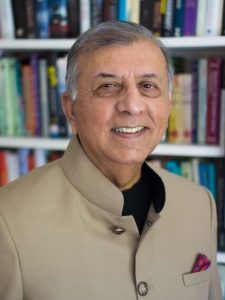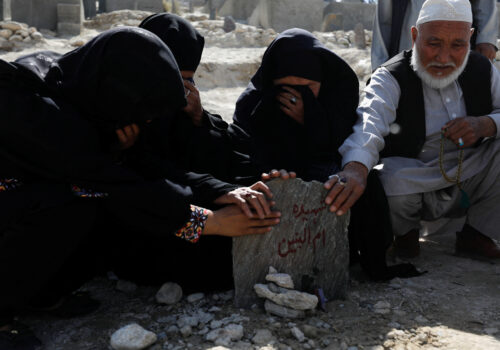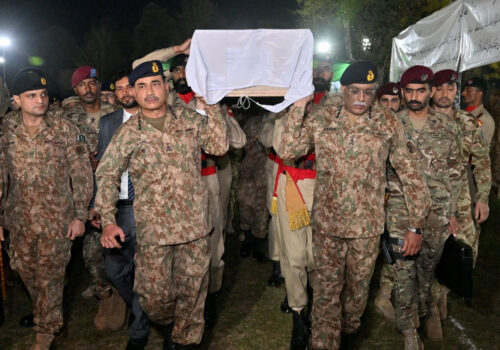The unfinished efforts against terrorism and militancy in Pakistan
Introduction
Terrorism has reemerged in Pakistan; since August of 2021, attacks have spiked approximately 50 percent, with Voice of America reporting that “violence claimed by or blamed on the TTP [Tehreek-i-Taliban Pakistan] and other militant groups killed almost 1,000 Pakistanis, including nearly 300 security forces, in some 376 terrorist attacks in 2022.”
Pakistan has long struggled to contain non-state groups operating on its soil, and it is a country familiar with intersecting crises. Today, the Islamic Republic is facing deep economic and financial challenges combined with political turmoil as various power centers vie for control of its fragile democracy.
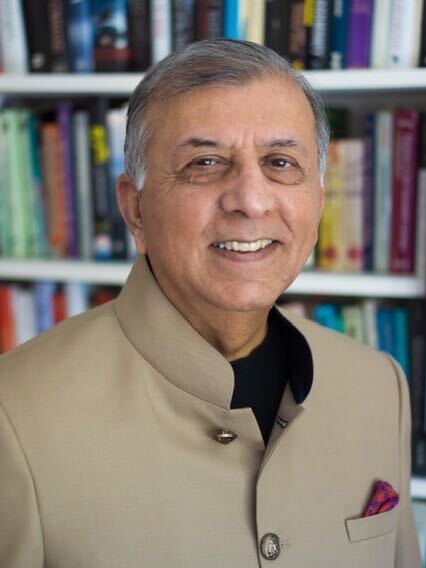
In this context, Pakistan cannot afford complacency regarding its growing terrorism threat. The TTP’s operational capacity has grown significantly following the takeover of the Afghan Taliban next door, and it along with peer militant groups present an existential threat to Pakistan’s security and the stability of its neighborhood.
To understand how Islamabad should respond to this heightened threat, South Asia Center Distinguished Fellow Shuja Nawaz led a series of conversations with experts about fighting terrorism and militancy in Pakistan.
The interviews have been categorized into three segments:
- State security, cross-border dynamics, and law enforcement, featuring Sen. Mushahid Hussain, Lt. Gen. Aamer Riaz, and IGP Naveed Khan.
- Society, human security, and government-people social contract, featuring Dr. Farhat Taj, MP Mohsin Dawar, and Dr. Madiha Afzal.
- A conversation with Inspector General Police Tariq Parvez, former inspector general of police and the first coordinator of the National Counter Terrorism Authority of Pakistan (NACTA).
Part I
State security, cross-border dynamics, and law enforcement
Featuring

Senator Mushahid Hussain Sayed is a current Pakistani Senator and Chairman of the Senate Defence Committee. A graduate of the Georgetown Master of Science in Foreign Service (MSFS) program (Class of 1975), Senator Hussain Sayed has a distinguished career in the Pakistan public service as a four-time elected senator from the Islamabad Federal Capital. His public service career also includes positions as the Chairman of the Prime Minister’s Task Force on Central Asia (1992), Leader of Pakistan’s Delegation to the UN Human Rights Commission in Geneva (1993), Special Assistant to the Prime Minister (handling relations with the U.S. & Central Asia) (1993), and Minister for Information, Culture & Tourism (1997-1999).
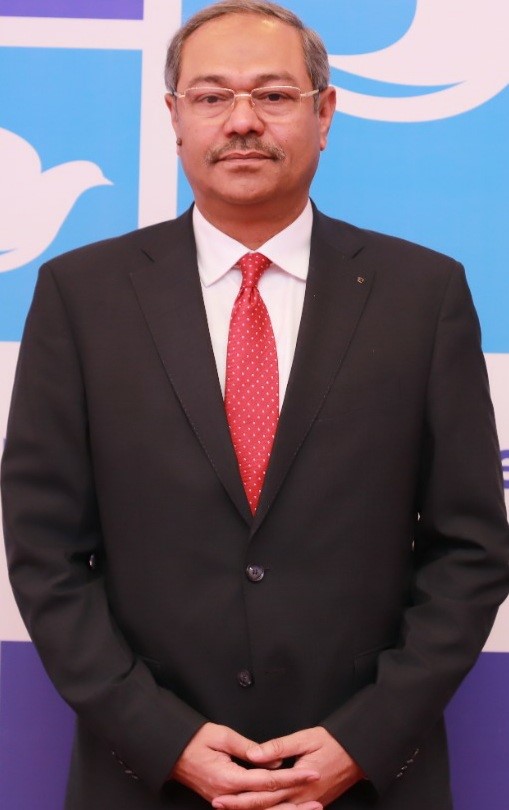
Lt. Gen. Aamer Riaz (Retd) was commissioned in the Pakistan Army in 1984. He commanded two corps, one on the western border and one on the eastern border and held various higher staff assignments, namely, Chief of Staff of a corps and Director, General Military Operations Directorate at GHQ. Lt. Gen. Riaz held instructional assignments at various military institutions and also remained president of National Defence University Islamabad. During his service, he remained engaged in military diplomacy to bring peace and stability in the region. Lt. Gen. Riaz has had speaking engagements at several civil and military institutions. Lt. Gen. Riaz is also a member of the board of governors of a newly established National University of Security Sciences, NUSS.
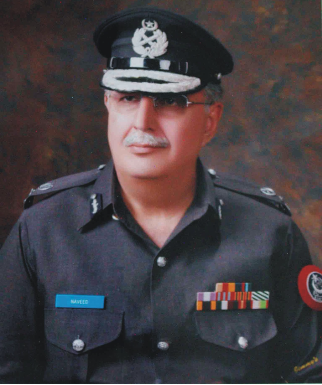
Inspector General Naveed Khan was born in Kohat, Pakistan in 1950. He graduated from Punjab University (Lahore) and joined the Police Service of Pakistan in 1972. Khan served as the Head of several district and divisional Police forces, provincial and federal intelligence agencies in KPK and as Commandant of Paramilitary force (Frontier Constabulary). He spent 5 years in the Middle East as a diplomat. His last posting before retirement in August 2010 was the Inspector General of Police, KPK province where he headed a 75,000 strong police force in the most difficult period during the height of Taliban militancy.
Part II
Society, human security, and government-people social contract
Featuring

Dr. Farhat Taj has a Ph.D. degree in Sociology of Law. She is associate professor at the University of Tromso, Norway. She has also worked as Assistant Director, Colleges and as Planning Officer (education) in the government of Khyber-Pakhtunkhwa, Pakistan. She successfully led three field research projects (2011, 2011 and 2012) for the Internal Displacement Monitoring Center, IDMC Geneva, on conflict-driven displacement in the northwest of Pakistan. Dr. Taj also conducted independent research funded by the Norwegian Writers Association and Fritt Ord. The research is reported in her books, Taliban and Anti-Taliban (2011) and The Real Pashtun Question (forthcoming 2016).

Mohsin Javed Dawar is a Member of the National Assembly of Pakistan from North Waziristan, Chairman of the Foreign Affairs Committee in the National Assembly of Pakistan, and Central Chairman in the National Democratic Movement. He is the co-founder of the human rights movement Pashtun Tahafuz Movement (PTM). He has formerly served as president of the National Youth Organisation (NYO) and the Pashtun Students Federation (PSF), the allied wings of the Awami National Party (ANP). From 11 to 14 March 2022, he was part of the Pashtun National Jirga, which was held in Bannu to discuss the critical issues faced by Pashtuns in Pakistan and Afghanistan.

Dr. Madiha Afzal is a David M. Rubenstein Fellow in the Foreign Policy program at the Brookings Institution in Washington, DC. Her research lies at the intersection of political economy, development, and security, with a focus on Pakistan. She previously worked as an assistant professor of public policy at the University of Maryland, College Park. Dr. Afzal is the author of “Pakistan Under Siege: Extremism, Society, and the State,” published by the Brookings Institution Press in 2018. She has also published several journal articles, book chapters, policy reports, and essays.
Part III
A conversation with Inspector General Police Tariq Parvez on the rise of terrorism and militancy in Pakistan
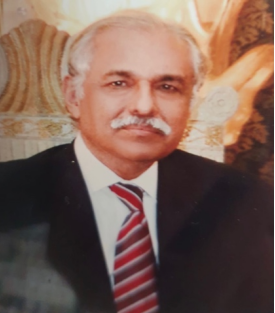
Tariq Parvez joined the Police Service of Pakistan in the rank of Assistant Superintendent of Police in 1973 and retired in the rank of Inspector General of Police in 2008, from the post of Director General of Federal Investigation Agency, Pakistan. Terrorism in the name of religion started in Pakistan, on a sustained basis in 1990 from Punjab. Parvez dealt with the phenomenon indirectly as DIG of Gujranwala, Bahawalpur, and Lahore from 1993 to 1997. In 1997, he was posted as Executive Head of Counter Terrorism Department Punjab, thus dealing directly with extremism and terrorism. He was awarded Sitara e Imtiaz by the President of Pakistan in 2004 for services in the field of CT. Parvez was posted as the Director General of the Federal Investigation Agency from 2005 to 2008 and dealt with terrorism at the national level. After retirement he was tasked to establish the National Counter Terrorism Authority (NACTA) and appointed its first National Coordinator. Presently he is a member of NACTA’s committee of experts as well as President, Advisory Board, National Initiative against Organized Crime.
Shuja Nawaz: In light of the recent attack on the Peshawar mosque, the bombing that killed large numbers of people, I wanted to ask you whether you see a similarity in the way the government is approaching this incident, as it handled the nine-year-old incident when the army public school in Peshawar was attacked and many lives were lost. Subsequently, attacks took place in Balochistan also where up to sixty people in one attack were killed. Do you see a similarity?
Tariq Parvez: Before I respond to your question specifically, I would like to give a brief overview of the context. 2009 was the worst year ever in Pakistan in terms of terrorist attacks in a year. Ever since then, there was a consistent and significant decline in the number of terrorist attacks over 2009-2020. In fact, the number of terrorist attacks in Pakistan decreased by almost 95 percent during these years. Then in 2021, we witnessed a reversal in this trend. For the first time in ten years, the terrorist attacks in 2021 were more than the terrorist attacks in the preceding year, i.e., 2020. A cause for further concern was that during 2022 this trend continued and the realization that this was not a short-term development, but a more sustained trend.
I wasn’t surprised by this reversal of trend. Why? For two reasons. Number one, that while we got the short-term objectives right in countering terrorism, we erred in terms of formulating long-term policies and responses to the terrorist threat. The result was, that while we succeeded in effectively dealing with the terrorist threat in the short term, from 2009 to 2020, this effectiveness could not be sustained. The reasons were two-fold. One, the counter-terrorism effort was, primarily, military led, with the civilian institutions playing a secondary role. This was an ad-hoc approach because, for the long-term solution to succeed, you should let the civilian institutions, whose role it is to counter terrorism, play their role. That was one weak area in our earlier response. The second weak area was that our entire focus was on kinetic actions. Of course, eliminating these militant networks is required, and kinetic actions are a very important part of counter-terrorism, but that doesn’t mean that the non-dynamic part, the ideological part, the part that deals with the factors that breed terrorism, should be ignored. We chose only the kinetic approach. So while the TTP, the main terrorist organization in Pakistan, went down and was cleared from the erstwhile Federally Administered Tribal Areas (FATA) it wasn’t eliminated. Its ideology continued to resonate with segments of our society, because we had ignored addressing the non-kinetic dimension. And as soon as it got an opportunity to come up, it did.
One important factor for the recent resurgence of terrorism by TTP in Pakistan was the change of its leadership. The TTP leader Mullah Fazlullah was killed in a reported drone attack in June 2018. He was succeeded by a leader from the Mehsud tribe again, Mufti Noor-Wali Mehsud. He focused on uniting the TTP factions. The TTP had become a fragmented organization with about twenty factions and they all were fighting each other. In fact, it was easier for the government to deal with factions, but now after two years of his efforts, he brought back all the factions and hence we are confronted with a united TTP once again. That is one factor, is important for the resurgence of terrorism, and more important than this unification is the takeover by the Taliban in Afghanistan which helped the TTP in two ways. One, it was a huge morale booster: the TTP morale had been low. They were down in the dumps. Suddenly they stood up and said, “well if the Taliban can defeat the American army and its allies, we can do it also.” Number two, their main safe haven was Afghanistan and so they got a very important sanctuary which was not there earlier. Now they can move freely, and they have active assistance also. That is the basic reason why we see the resurgence.
Coming back to your question on the response of the Pakistani state, one of the weak areas of the response now is the Pakistan state itself is in a very weak position compared with 2009. Today we have political instability, we have an economic meltdown, and we have these security issues.
Coming back to your question on the response of the Pakistani state, one of the weak areas of the response now is the Pakistan state itself is in a very weak position compared with 2009. Today we have political instability, we have an economic meltdown, and we have these security issues.
Unless the government is completely focused on dealing with the terrorism and is not consumed by these issues of economic survival, or political partisanship, the terrorists may survive for long. They take economic and political chaos in Pakistan as an opportunity. We need to act comprehensively against them, focusing equally on kinetic and non-kinetic measures, to defeat them in the long term. We have to drain the swamp that breeds them.
SN: What non-kinetic actions need to be taken?
TP: Non-kinetic actions means two or three things. Number one, countering the narrative of the TTP. Unless the narrative of the TTP resonates with the roots of the TTP and within their strongholds, they’re not likely to get volunteers. We didn’t do anything to counter that ideology. That is one area of a non-kinetic aspect that we ignored. A second area is that we took a very important decision of merging Khyber Pakhtunkhwa province with FATA districts. FATA was a stronghold of the terrorists. The feedback which I have gotten from the people there about the commitments made to the people of the FATA in terms of investments for their development were not fulfilled. So what has happened is that while we have formally and institutionally made former FATA part of the KP province, we did not follow up with the promises which we made, and the result of that is resentment amongst the local population which provides fertile ground for the TTP.
Another factor that I think was a policy decision to open negotiations with the TPP. I think that was an ill-advised move, not well thought out. It was probably not inclusive. By inclusive, I mean having all points of views of the local inhabitants contributing to it. It was confined to a very small group of people who decided to go ahead with it. I remember police officers in Swat told me they were informing the government that there were reports by the local inhabitants of sighting Taliban, although in small groups, in their villages. It was pointed out that it may be a planned return of the Taliban to their villages in Swat. No one paid any heed to these police reports. And then the Taliban told the locals that “we are coming here as the result of an agreement. We have been allowed to leave Afghanistan and come back to our homes in the villages in Pakistan.” They expressed their surprise that the local police were not told about this agreement. The police weren’t aware of it, the local people weren’t aware of it.
We were told by the decision makers that “they are Pakistanis, who had left their homes as a result of the military operations against the terrorists, and they have to come back to their country.” They are Pakistanis, certainly, but they are criminals, they are terrorists. I think we were in too much of a hurry or trying to be too generous in taking them back. But thank God, thank God the people of Swat protested in a very powerful way, against the return of these members of TTP back to their homes and villages. As a result of these massive public protests against the return of the TTP members, the government was forced to give up the repatriation and resettlement plan of these Afghanistan based TTP members.
SN: What are the ties between the TTP and Punjabi militant organizations?
TP: Before the TTP came into existence in 2007, we used to have two terrorist organizations based in Punjab, v.i.z. Lashkar-e-Jhangvi, which was focused exclusively on targeting Shias, and Jaish-e-Mohammed, which was Punjab-based and with strong roots in South Punjab. In fact, that was the mother organization that fed other jihadist Islamist militant groups. After the emergence of the TTP, militancy in Pakistan became predominantly, if not primarily, a Pakhtun phenomenon. And the Punjabis slowly slid into the background. Maybe there are some factions which did fight in Afghanistan alongside the Taliban against the Coalition forces. But, I think the link now is much weaker than it was. In fact, this is a very important point that you raise. The TTP might be looking for ties in the Punjab, to expand its activities to the biggest province of Pakistan, instead of confining itself to Pakhtun communities.
The militant organizations which held anti-Shia agendas have gone into the background. But those elements of militancy in Afghanistan who are anti-Shia are looking for alternative sources of support.
Another important point I would like to highlight is the anti-Shia sentiment in Pakistan. The militant organizations which held anti-Shia agendas have gone into the background. But those elements of militancy in Afghanistan who are anti-Shia are looking for alternative sources of support. In Afghanistan, the Islamic State-Khorasan has a strongly anti-Shia agenda and is looking for allies in Pakistan. In the years ahead, we might witness a resurgence of sectarian terrorism in Punjab, through a liaison between the Afghanistan-based IS-K and anti-Shia militants, spread over into many religiously motivated terrorist organizations like Lashkar-e-Jhangvi, Jaish-e-Mohammad, even TTP, because all these militant organizations belong to the Sunni subsect of Deobandis, which has streaks of anti-Shiaism.
SN: So, who needs to coordinate the fight against militancy and terrorism inside Pakistan? Will it be NACTA?
TP: Absolutely. In fact, that was the original rationale for NACTA. Based on my own experience, I found that one weak area of counter-terrorism was that the provinces were acting in silos. The federal government, its Intelligence Bureau (IB), and the provinces, were not in touch with each other. ISI (Inter-Services Intelligence) and IB were not partnering or sharing information. There was no formal structure for collaboration. Whatever happened was sort of informal, on a friendly basis or whatever. That is why I proposed that there should be an organization which gives unity to the anti-terrorism effort, and that has to be a civilian institution. I remember people used to ask me, you are setting up NACTA, what if the military doesn’t cooperate? My reply was that the basic problem is the lack of coordination between the civilian agencies. Even the provinces are not talking to each other. So in the first place let the civilian intelligence bureau, and other civilian agencies share that information, and then after the ISI would also join in.
The main point that I want to make is that the need of NACTA is based on the fact that there is no oversight body to inform the government about the implementation of the various policy layers. I don’t know who is supposed to do it.
A twenty-point National Action Plan to counter terrorism was formally launched after the Peshawar public school incident in December 2014. It was expressly stated in the National Action Plan that for every point (twenty in all, I was a member of that committee so I know), specific action plans will be drawn up with specific measurable objectives. And for that the PM (prime minister) of Pakistan at that time, Mr. Nawaz Sharif, set up thirteen committees. But no follow-up occurred, because NACTA could not play an effective role due to various reasons.
Second, while the set of players for kinetic action are the military and the criminal justice system, for non-kinetic measures, a different set of players is needed, maybe headed by media experts, IT (information technology) specialists, development experts, religious leaders, youth leaders, education experts, etc. Carrying out the non-kinetic aspect of counter-terrorism through military or police is not likely to be effective, because it is not their expertise or field. So if there is a civilian organization that would give greater importance to this effort, then let us move forward with that.
A lot of initiatives to win the hearts and minds of youth are being taken in Balochistan, but when I meet the Baloch youth, they care about the disappearances.
A lot of initiatives to win the hearts and minds of youth are being taken in Balochistan, but when I meet the Baloch youth, they care about the disappearances. They forget the good part, but they remember that so-and-so’s brother was picked up, so-and-so has been killed. We have to take these views into account.
I think NACTA is the way forward, although at present I don’t think an all-powerful interior minister is going to let it go. But I remember the day you told me that the DG-ISI (director-general, Inter-Services Intelligence) had said to you that if NACTA reports to the prime minister, we will cooperate. I hope that comes to pass.
Moderated by

The South Asia Center is the hub for the Atlantic Council’s analysis of the political, social, geographical, and cultural diversity of the region. At the intersection of South Asia and its geopolitics, SAC cultivates dialogue to shape policy and forge ties between the region and the global community.
Related content
The latest analyses on Pakistan and US-Pakistan affairs from the South Asia Center.
Image: Locals participate in a campaign ahead of the legislative assembly elections in Sherqilla, Gilgit Baltistan, Pakistan, November 10, 2020. Picture taken November 10, 2020. REUTERS/Umar Farooq
